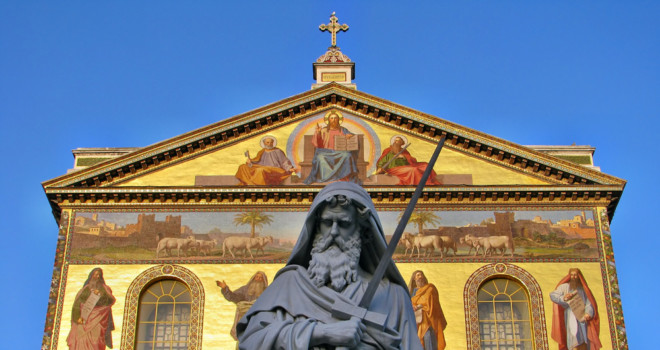Why Did I Choose Catholicism Instead of Another Religion?, by Peter Kreeft

6 Christmas Books for Your Family, by Sherry Antonetti
December 18, 2018
National Sovereignty is Paramount, Says Dr. Land, by Chad Groening
December 18, 2018
By Peter Kreeft, Catholic Exchange, December 18, 2018
There are many religions in the world. Why did I choose to be a Catholic? Here are the steps in my reasoning.
Religion or No Religion?
My first choice was between religion and no religion. Religion means a “yoke” or a “binding-back relationship.” Religion is a relationship with God. (God here is taken in the broadest sense as at least some higher power, something greater than us.) So, an atheist is one who believes that there is no God at all, and therefore there ought to be no religion at all.
The arguments against atheism are well known. The two that are mentioned in the Bible are,
-
The evidence in nature: Who made it? Did the “Big Bang” just happen for no reason or cause? And why is it so intelligently designed?
-
The absoluteness of conscience: Why is it always morally wrong to disobey your conscience deliberately? Where did it get that absolute authority if it didn’t come from God but only from chance, genetics, evolution, society, or your parents, none of which are infallible?)
The two basic reasons I’m not an atheist are not my mother and father, but my conscience and my universe.
One or Many?
My next choice was between one God and many gods. Polytheism is not a live option today. It’s almost totally dead. I’ve never met a polytheist. In fact, in one sense, polytheism never existed, because behind all the many gods of polytheism we almost always find one supreme God. Something or Somebody must be Number One. There can’t be two absolutely absolute absolutes.
Theism or Pantheism?
This article is a preview of Forty Reasons I Am a Catholic.
My next choice was between the God of the Bible, who personally created the universe, and the god of pantheism (the god of Upanishadic Hinduism, or the cosmic “Buddha mind,” or the Tao, or “the Force” of “Star Wars”), which is not a superhuman person with a moral will but just a nameless mind or force or ideal.
One reason for preferring biblical theism to pantheism is that the pantheist’s god is everything, and therefore is evil as well as good. I cannot love or worship or guide my life by a god who has a “dark side,” who is half evil or indifferent to good and evil.
Another reason for theism over pantheism is that only the God of the Bible (of Judaism and Christianity and Islam) unites what have always been the two deepest instincts in the human heart — namely, the religious instinct and the moral instinct. We are morally responsible to this God.
Do I Accept Christ’s Divinity or Not?
My next choice, once this God is accepted, is whether to accept or reject Jesus’ claim to be divine, to be the Son of this God. That is the essence of Christian theology, as distinct from Jewish or Islamic.
I cannot get around the “Lord, liar, or lunatic” argument. If Jesus is not divine, then He was the maddest madman or the most blasphemous egomaniac who ever lived; not the best of men but the worst. “I’m divine; worship me; trust me with your soul’s eternal salvation. I am perfect. It was I who designed your universe and your soul.” Has anyone in history ever told a bigger lie than that?
If that’s who He really was (either liar or lunatic), then who invented the Jesus of the Gospels, who is the polar opposite of both a liar and a lunatic: honest, altruistic, passionate, wise, practical, creative, saintly, and fascinating? That last adjective is the most telling one because it is impossible to imitate successfully. Once you get to know them, lunatics are never really fascinating, and neither, once they become familiar, are lying egomaniacs.
Even if Jesus is totally fictional, He is the most fascinating and compelling literary figure in human history. Who invented Him? If He is fictional, who invented that new genre of realistic fantasy twenty centuries before Tolkien? A bunch of peasant Galilean fishermen?
Is the Church the One Jesus Founded?
The next choice was about the claim of the Catholic Church to be the Church Christ founded and authorized. This was harder for me, since I was brought up as a Protestant. But the historical record of the Catholic Church’s continuity in doctrine, in apostolic succession, and in her belief in the Eucharistic Real Presence for two thousand years is data too massive to ignore or explain away.
If I was going to be a Christian, I had to be where Christ Himself wanted me to be, in the thing He Himself created for me as my spiritual home and as the instrument of His teaching authority. And the Bible itself tells us that that thing is not just the Bible but the Church.
So, the links in the chain are: (1) religion, not atheism; (2) monotheism, not polytheism; (3) theism, not pantheism; (4) Christianity, and therefore Trinitarianism, not Unitarianism; and (5) Catholicism, not Protestantism. Or, (1) Higher Power, (2) One, (3) Creator, (4) Christ, (5) Church.
The three most important links in this chain are the last ones: that the material universe is God’s creation, Christ is God’s incarnation, and the Church is Christ’s body.
All that is not yet quite a proof but is the map of a journey, which can also be the map of a proof, i.e., a justification of the journey, an obeying of the first pope’s command to “be prepared to make a defense [of] the hope that is in you” (1 Pet. 3:15). The details of that justification are in many good books of apologetics.
_______________________





